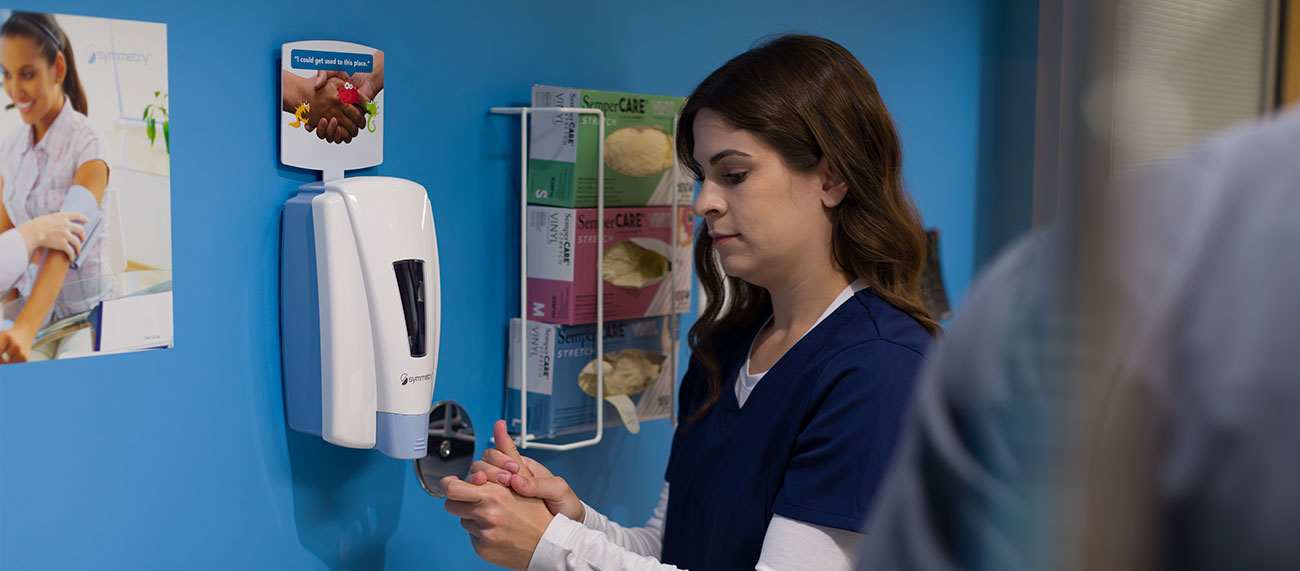Acceptance = Compliance = Lower HAIs
Hand hygiene noncompliance is a major contributing factor to healthcare-associated-infections (HAIs), but it is also one of the easiest practices to improve. Symmetry understands the importance of hand hygiene acceptance and manufactures products that healthcare workers want to use.
A 200-bed hospital incurs $1,779,283 in annual MRSA infection-related expenses attributable to hand hygiene non-compliance. A 1% increase in hand hygiene compliance can save that hospital $39,650.
Source: Infection Control and Hospital Epidemiology April 2010, Vol. 31, No. 4
Complete Line of Hand Hygiene Products
Less likely to contribute to dry hands
Reduce common disease-causing bacteria
Leave no sticky residue behind
High quality and low-cost products
Packaging is BPA-free
BPA (bisphenol A) has been linked to health problems
Symmetry's U.S. based, vertically integrated supply chain guarantees access to essential products even in unprecedented times.
Product Efficacy
Symmetry hand sanitizers and hand washes have been proven to reduce common disease-causing bacteria.
Symmetry products have been tested against common FDA TFM bacteria, including Acinetobacter baumannii, Escherichia coli, Staphylococcus aureus, Streptococcus pyogenes (Group A), and more. They have also been tested against additional organisms including, but not limited to Clostridium difficile (vegetative), Staphylococcus aureus MRSA, and Salmonella enterica serotype typhimurium.
For a complete list of efficacy claims, please refer to the literature sheets for each product.
WHO 5 Moments for Hand Hygiene
The 5 Moments for Hand Hygiene approach defines the key moments when healthcare workers should perform hand hygiene. This evidence-based, field-tested, user-centered approach is designed to be easy to learn, logical and applicable in a wide range of settings.
1. Before Patient Contact
2. Before Aseptic Task
3. After Body Fluid Exposure Risk
4. After Patient Contact
5. After Contact with Patient Surroundings
What do you do for hand hygiene compliance at Point of Care?
Point of Care refers to the moments when healthcare workers are in contact with patients and are at the highest risk of spreading infections. Increase hand hygiene compliance, improve HCAHPS scores, and reduce HAIs (healthcareassociated infections) with Symmetry Point of Care items.
Dispensers

Symmetry dispensers offer the highest level of precision and durability. The user-driven design is made of ABS plastic featuring a large sight window, and hidden and keyed integrated lock options.
Customizable Awareness & Education Materials
The Symmetry Hand Hygiene Program offers informative, customizable education and awareness tools that focus on the “HOW” and “WHY” of proper hand hygiene to help you maximize hand hygiene practices in your facility.
Some of the materials we provide include:
Wall Charts, Posters, Product Literature and Handwashing Videos
Symmetry Behavior Modification System
SBMS
Symmetry utilizes behavioral science to drive hand hygiene practices. As a value-added component of our program, the SBMS is a set of unique placards and signs with messages designed to inspire and maximize hand hygiene practices.
TAKE THE SYMMETRY CHALLENGE
Your symmetry representative sets a date and time with you to hold a product evaluation Expo at your facility.
Participants test hand hygiene products and fill out a product evaluation survey.
Once product testing and evaluation are complete, the results from each hand hygiene program are tallied and revealed.